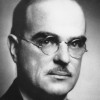It is sometimes said of a man who lives alone that he does not like society. This is like saying of a man he does not like going for walks because he is not fond of walking at night in the forêt de Bondy.
[On dit quelquefois d’un homme qui vit seul: il n’aime pas la Société. C’est souvent comme si on disait d’un homme qu’il n’aime pas la promenade, sous le prétexte qu’il ne se promène pas volontiers le soir dans la forêt de Bondy.]
Quotations about:
hermit
Note not all quotations have been tagged, so Search may find additional quotes on this topic.
Be able to be alone. Loose not the advantage of Solitude, and the Society of thy self, nor be only content, but delight to be alone and single with Omnipresency.
Thomas Browne (1605-1682) English physician and author
Christian Morals, Part 3, sec. 9 (1716)
(Source)
No one can be happy in eternal solitude.
Anne Brontë (1820-1849) British novelist, poet [pseud. Acton Bell]
The Tenant of Wildfell Hall, ch. 7 “The Excursion” [Helen] (1848)
(Source)
From these things therefore it is clear that the city-state is a natural growth, and that man is by nature a political animal, and a man that is by nature and not merely by fortune citiless is either low in the scale of humanity or above it, like the “clanless, lawless, hearthless” man reviled by Homer, for one by nature unsocial is also ‘a lover of war’ inasmuch as he is solitary, like an isolated piece at draughts.
[ἐκ τούτων οὖν φανερὸν ὅτι τῶν φύσει ἡ πόλις ἐστί, καὶ ὅτι ὁ ἄνθρωπος φύσει πολιτικὸν ζῷον, καὶ ὁ ἄπολις διὰ φύσιν καὶ οὐ διὰ τύχην ἤτοι φαῦλός ἐστιν, ἢ κρείττων ἢ ἄνθρωπος: ὥσπερ καὶ ὁ ὑφ᾽ Ὁμήρου λοιδορηθεὶς “ἀφρήτωρ ἀθέμιστος ἀνέστιος:” ἅμα γὰρ φύσει τοιοῦτος καὶ πολέμου ἐπιθυμητής, ἅτε περ ἄζυξ ὢν ὥσπερ ἐν πεττοῖς.]
Aristotle (384-322 BC) Greek philosopher
Politics [Πολιτικά], Book 1, ch. 2 / 1253a.2 [tr. Rackham (1932)]
(Source)
See Homer. Original Greek. Alternate translations:
From these considerations, therefore, it is clear that the State is one of Nature's productions, and that man is by nature a social animal, and that a man who is without a country through natural taste and not misfortune is certainly degraded (or else a being superior to man), like that man reviled by Homer as clanless, lawless, homeless. For he is naturally of this character and desirous of war, since he has no ties, like an exposed piece in the game of backgammon.
[tr. Bolland (1877)]
Hence it is evident that the state is a creation of nature, and that man is by nature a political animal. And he who by nature and not by mere accident is without a state, is either a bad man or above humanity; he is like the "tribeless, lawless, hearthless one," whom Homer denounces -- the natural outcast is forthwith a lover of war; he may be compared to an isolated piece at draughts.
[tr. Jowett (1885)]
Hence it is evident that a city is a natural production, and that man is naturally a political animal, and that whosoever is naturally and not accidentally unfit for society, must be either inferior or superior to man: thus the man in Homer, who is reviled for being "without society, without law, without family." Such a one must naturally be of a quarrelsome disposition, and as solitary as the birds.
[tr. Ellis (1912)]
From these things it is evident, then, that the city belongs among the things that exist by nature, and that man is by nature a political animal. He who is without a city through nature rather than chance is either a mean sort or superior to man; he is "without clan, without law, without hearth," like the person reproved by Homer; for the one who is such by nature has by this fact a desire for war, as if he were an isolated piece in a game of backgammon.
[tr. Lord (1984)]
The wide world is all about you: you can fence yourselves in, but you cannot for ever fence it out.
J.R.R. Tolkien (1892-1973) English writer, fabulist, philologist, academic [John Ronald Reuel Tolkien]
The Lord of the Rings, Vol. 1: The Fellowship of the Ring, Book 1, ch. 3 “Three Is Company” [Gildor, to Frodo] (1954)
(Source)






